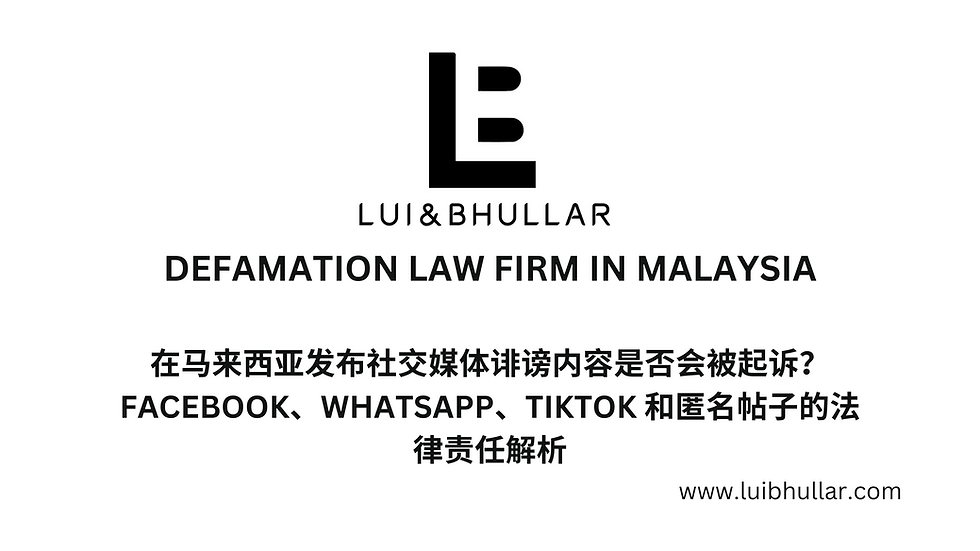Defamation in Malaysia: Landmark Case of TUANKU NUR ZAHIRAH v. CLARE LOUISE BROWN & ORS
- Messrs Lui & Bhullar
- Jan 11, 2025
- 4 min read
Updated: Oct 15, 2025
By:
Bryan Lui (Co-Managing Partner) [bryan_lui@luibhullar.com]
Harneshpal Karamjit Singh (Co-Managing Partner) [harnesh_bhullar@luibhullar.com]

Defamation law in Malaysia plays a vital role in balancing free speech and protecting individuals' reputations. The recent case of Tuanku Nur Zahirah v. Clare Louise Brown & Ors stands out as an important ruling in the legal landscape, shedding light on the standards for defamation claims in the country.
The case involved the Sultanah of Terengganu, who filed a defamation claim against the authors, publisher, and printer of The Sarawak Report: The Inside Story of the 1MDB Expose for certain defamatory statements in the book.
The Case at a Glance
In Tuanku Nur Zahirah v. Clare Louise Brown & Ors, the first respondent, the author, published statements claiming that the Sultanah of Terengganu had been involved in the establishment of the Terengganu Investment Authority (TIA), which later became 1MDB. These statements implied that the Sultanah interfered with the administration of the state and had ties to Jho Low, a notorious figure. The plaintiff, Tuanku Nur Zahirah, argued that these statements were defamatory and tarnished her reputation.
The High Court initially dismissed the defamation claim, but on appeal, the Court of Appeal ruled in favor of the Sultanah, highlighting important points in defamation law and the significance of factual accuracy.
Key Findings in the Case
1. Determining Defamatory Meaning
In the Tuanku Nur Zahirah case, the Court of Appeal emphasized that the natural and ordinary meaning of the statements should be considered based on the original printed form, without relying on extrinsic evidence. The court ruled that over-elaborating on the analysis or relying on sources like dictionaries could unnecessarily complicate the case for the plaintiff.
The defamatory meaning in the statements was clear:
The Sultanah was accused of using her influence to support Jho Low's role in the TIA.
She was portrayed as having control over the administration of the State of Terengganu.
The statements implied her involvement in corrupt practices.
The Court concluded that these allegations were capable of being defamatory as they were likely to expose the Sultanah to hatred, ridicule, or contempt in the eyes of a reasonable person.
2. Admission of Mistaken Identity
A key element of the case was the defendants' admission of a mistake in identifying the plaintiff. The book stated that the Sultanah had introduced Jho Low to the Sultan of Terengganu, which was factually incorrect. The correction of this error supported the plaintiff's defamation claim, as it further highlighted the publication's failure to exercise due diligence in verifying facts before publication.
3. Failure of Justification Defense
In Tuanku Nur Zahirah v. Clare Louise Brown & Ors, the defendants' attempt to justify the statements as true was unsuccessful. They could not substantiate their claims that the Sultanah had played a direct role in supporting Jho Low's advisory position in the TIA. As such, the defense of justification was dismissed, confirming that the statements were both inaccurate and defamatory.
4. Damages and Accountability
The Court of Appeal awarded the Sultanah RM300,000 in damages, considering various factors:
The lack of remorse shown by the first defendant, Clare Louise Brown.
The plaintiff’s high standing in society.
The wide circulation of the book and its negative impact on the plaintiff’s reputation.
The second and third defendants, the publisher and printer, were also held jointly liable for the damages, ensuring that all parties responsible for the defamatory publication were held accountable.
Defamation Law in Malaysia: Key Takeaways
The Tuanku Nur Zahirah case serves as an important precedent for defamation law in Malaysia. Here are key takeaways for those involved in defamation claims:
The Ordinary Reader Test: Courts assess whether a reasonable person would interpret the statement as defamatory, focusing on its natural meaning.
Liability of Publishers and Printers: Publishers and printers can be held jointly liable for the defamatory content in books, newspapers, and other media.
Defenses in Defamation: Defendants must provide evidence to support claims of justification or fair comment; failure to do so will result in the dismissal of such defenses.
Consideration of Damages: When assessing damages, factors like the plaintiff’s societal status and the extent of publication play a critical role in determining the compensation awarded.
Protecting Reputation in the Digital Age
In today’s world, where books, articles, and online publications spread information rapidly, defamation claims are becoming increasingly significant. Tuanku Nur Zahirah v. Clare Louise Brown & Ors reminds us of the importance of ensuring accuracy in publications and the legal consequences of defamation.
For anyone facing defamation issues, it is essential to seek legal advice from experts in defamation law in Malaysia. Whether the claim involves libel, slander, or online defamation, understanding the key aspects of the law will help you protect your reputation and pursue justice.
If you believe you have been defamed or require expert legal advice on defamation claims in Malaysia, contact our team today to safeguard your reputation and secure fair compensation.
Please contact us for a free consultation via WhatsApp (+60143000970) or E-mail (general@luibhullar.com) for any queries.




Comments